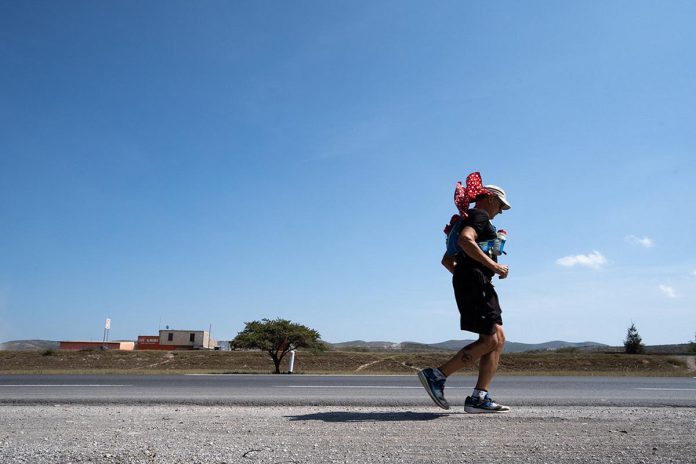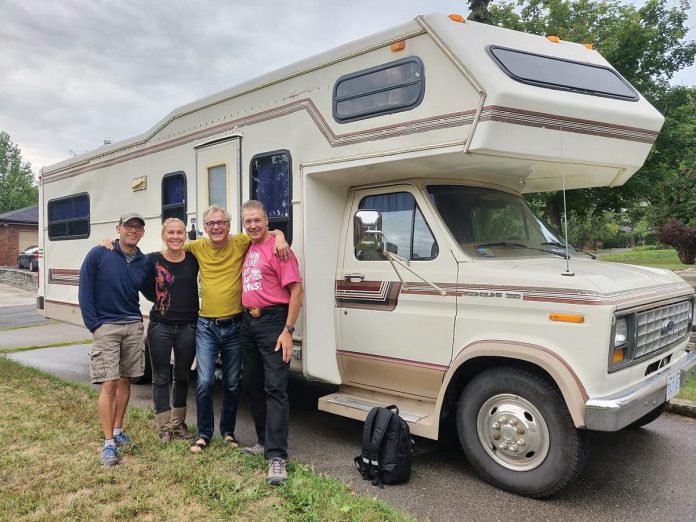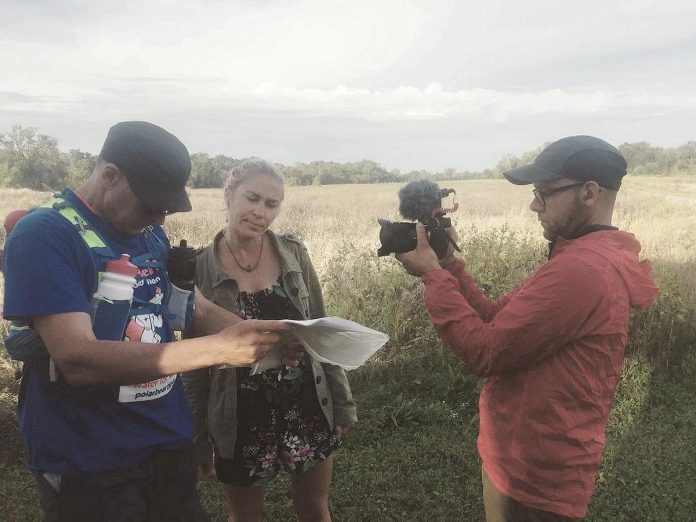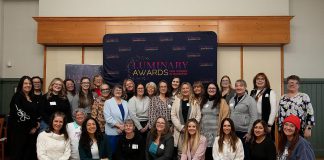
When Carlotta James had the idea of organizing a multinational 4,300-kilometre ultra race to raise awareness for the endangered monarch butterfly back in 2019, there was no doubt in her mind that it had to become a documentary.
And having just watched what she describes as a “moving” short environmental video from filmmaker Rodney Fuentes, James knew he would be the right person to tell the story.
“From the first moment we met, our synergy was very aligned and our value system is very aligned,” she recalls. “We knew it was going be an epic undertaking — the hardest job of my whole life — but we wanted to tell this story and create this project.”
For his part, Fuentes says he never backs down from a challenge and, boy, did it sound like a challenge. But he knew it was an important one.
“Besides the challenge, it was a story,” he says. “What really caught my eye is it was about trying to feel what a monarch (butterfly) feels when migrating south, and trying to imagine how it would feel if we had to do that migration ourselves.”
Five years after the epic journey, that story is ready to be told as The Monarch Ultra premieres in Peterborough on Wednesday, October 23rd at 7 p.m. at Market Hall Performing Arts Centre. For $25 ($20 for students and children), tickets are on sale now for what will undoubtedly be a sold-out screening.
VIDEO: “The Monarch Ultra” trailer
“In telling this story to the world, we want people to be galvanized to action and to feel something about nature and about wildlife, so the documentary was central to this story,” James explains. “It’s such a beautiful thing to be lost in a movie for an hour or two and then come out feeling as though you’ve learned something, and then want to talk about it and do something about it.”
Over a challenging 47 days in fall 2019, joined by chef/driver Guenther Schubert and run director Clay Williams, James and Fuentes were a part of a group of ultra runners and environmentalists who followed the monarch’s 4,300-kilometre migratory path from Peterborough to Macheros, Mexico. Across many communities, the teams and relay runners were welcomed with warm celebrations, parties, and many friendly faces.
“We had no idea that a massive movement would start, and that so many communities would welcome us along the way,” says James. “We lost so much blood, sweat, and tears in making this happen, and there were great challenges that sometimes we wanted to give up and go home. But the human spirit and the support that we found along the way gave us more energy and more strength to keep going.”

If you’re envisioning it wasn’t an easy mission to be travelling in an RV across two international borders while filming ultra runners, you would be imagining correctly. Fuentes frequently biked alongside the runners in short spurts and used the frequent rest stations to film interviews along the way.
While the Monarch Ultra group received funding for the actual relay run, there was no money for production of the documentary. Fuentes used the equipment he had on hand, with no crew to assist him. Between obstacles such as the sounds of busy highways obscuring audio and having to find places to stop and charge camera batteries, Fuentes says it took a lot of “improvisation” to get usable footage for the documentary.
“When you’re in a creative world, you try not to see problems — you try to see solutions,” he explains. “So it’s about constant problem solving. If you get caught up in issues, then you won’t be able to move forward, and if we can’t move forward, then what are we doing?”
“I have an analogy a friend taught me once. He said, ‘It doesn’t matter what kind of pencil you have, I’m pretty sure you can write with it. All you have to do is sharpen it.’ I didn’t have a multi-million-dollar pencil. I wasn’t the CBC, and I didn’t have David Attenborough telling me what to do, but I still have a pencil and with that, we can write a story. It just required finding the ways to write the story.”
The limited budget is just one reason why the film took five years to produce. According to James and Fuentes, it was also essential to tell all sides of the story beyond the relay run. While the film follows the Monarch Ultra relay run, there are also interviews with people across the continent who have stories and experience relating to pollinators and their decline.
“It’s easier for us to talk about the problems here in Canada and even the U.S., but we have no idea what’s going on in Mexico,” Fuentes says. “What’s happening on the other side affects the population as much as what’s happening on this side of the world. It was extremely important for me to get the Mexican story on their conservation of monarchs.”
That meant the team returned to Mexico on several occasions after the relay run to collect these stories.
“It just feels more genuine to get their perspective on why the monarch butterfly is so important to them and also the challenges to their survival,” adds James.
For example, the film includes an interview with Gustavo Lopez, director of Nación Verde (“Green Nation”), a Mexican non-profit environmental organization that is helping to restore habitat loss from deforestation at Reserva de la Biosfera de la Mariposa Monarca, the mountain-top monarch butterfly biosphere reserve in Cerro Pelón.
Working with local Indigenous communities, Nación Verde has planted more than a million native trees, including oyramel fir trees, in the reserve. Mexico’s most endangered forest type, oyamel forests provide the appropriate conditions to support the annual hibernation of the monarch butterfly by giving them protection against strong winds, rain, and even snowfall and hailstorms.

While it includes these facts and other valuable information, Fuentes — who is the film’s narrator as well as the director — notes the documentary is still accessible because it doesn’t overly focus on scientific perspectives.
“There’s plenty of information there that makes people aware and they can do their own research,” he says. “The impact we want to have is that we can do something for nature and for ourselves, and we can be part of our community. That, to me, is one of the biggest messages.”
At the world premiere in Peterborough, James and Fuentes will both give a brief introduction prior to the screening, with a post-screening question-and-answer session where they will be joined by Schubert and Williams. Audience members will be able to ask questions about the monarch butterfly, the documentary, or about running the Monarch Ultra.
Those who can’t make the premiere will hopefully have other opportunities to watch the film, as Fuentes is submitting the documentary to film festivals across the province and internationally.
“I’m hoping this documentary inspires people to want to do more, learn more, and protect not just monarch butterflies, but all wildlife species,” says James. “And maybe get into running. Running is so great for mental health and physical health, and the more people that are running for monarchs or running for a cause, it just feels truly life changing.”
For more information about the documentary, visit themonarchultrafilm.com. For tickets to the premiere, visit tickets.markethall.org.

























